Amateur radio related diary
News items 2024
News items 2023
News items 2022
News items 2020-2021
News items 2016-2019
News items 2015
News items 2003-2014
Latest news and comments 2025
![]()
Amateur radio related diary
News
items 2024
News
items 2023
News
items 2022
News
items 2020-2021
News
items 2016-2019
News items 2015
News items
2003-2014
Update
30/12/2025: Almost the end of the year! I have not
been very active this year for various reasons. One of the main reasons has
been the rather poor band conditions, one solar eruption after the other. I
can only hope it will be better in 2026.
Another reason has been damage
to my HF antennas due to high winds. My poor hex-beam has been destroyed 3
times this year, as I write this it is still not fixed after the last huge
wind storm about a month ago, just a day before CQ WW CW. That messed up my
plans to compete in that contest completely!
I have not fixed the hex
beam yet, to be quite honest I am not sure I will fix it, it is simply not
strong enough to survive the wind storms we get here. I have been looking for
a more robust replacement. So far I have found a 3 element tri-bander, a log
periodic antenna and a monster 16 element, 60kg Optibeam! As much as I would
love the Optibeam it is simply too large and heavy for my tower or rotator.
Shipping is a big problem, the log periodic antenna is far away so that might
not happen. The 3 element tri-bander is closer but shipping is still an issue
plus it is an old antenna and would leave me without antennas for 12m and 17m.
So right now I am stuck with dipoles for 80-30m and an EFHW for 40-10m. It
works well but the EFHW is not happy on 12m and 17m. I need to sort out my
antenna situation soon else my interest and enthusiasm for amateur radio will
sadly fade.
On a more positive note I am hoping to activate a lot more
POTA entities in 2026. The motorhome is now setup with a decent off-grid power
system. So far I have used the IC-7300 in the motorhome but it is a bit bulky.
I then decided to rather use the Yaesu FT-891, a great radio but I know I will
miss the spectrum scope.
Fortunately an answer presented itself today,
I found a brand new Yaesu FT-991A! A deal was quickly made and I should have
it in the next few days. I think it will be perfect for use in the motorhome.
Now I just need to decide on antennas for the motorhome. Where it is feasible
I will use an EFHW but for short stops or while driving I would like some kind
of mobile antenna.
I also acquired a Yaesu FT-8900R quad band VHF/UHF
radio with separation kit for permanent installation in the motorhome.
Update
10/9/2025: Well the SARL Field day has come and
gone, I had fun but I have been too busy (or lazy?) to update this page. Today
I decide to not postpone it any longer else I might forget the details!
I managed to get to the place I had in mind for the field station about 1
hour before the 10am (local) starting time. I found a spot close to the hiking
trail (about 20m) that was accessible with my vehicle, there is no road but it
is reasonably level and the rocks small enough that you can drive there very
slowly and carefully in a 4x4 vehicle.
I erected the antennas, the 40m
dipole on the 8m mast and the EFHW on the 12m mast (only used 11m) strapped to
the sturdy (it had 3 guy ropes as well) 8m mast.
The masts worked well
but later in the day the wind came up and the 12m Spiderbeam mast started
bending really badly. I like the Spiderbeam mast but to be quite honest it is
too flexible, when it is windy no more than 8m is really usable. This makes
the more sturdy, and lighter, 8m Comet mast a better option most of the time.
Once I had everything setup the fun started. There were quite a few local
Field Day stations already on the air so I had quite a few nice, pre-contest,
chats. I compared the 40m dipole and the EFHW on the local 40m contacts and I
found that there was no difference, both worked really well.
It soon
became apparent that I must have chosen a really good spot! I was getting
really good signal reports on SSB running 5W, most stations could not believe
I was running only 5W. I had signal reports of 59 plus as much as 30dB from
stations all over Southern Africa.
I think I will be using this spot
again! It is on a gentile hill and open in all directions. Towards the north
there is a mountain but it is far enough away to be below 10 degrees above the
horizon so it did not interfere with my radiation take-off angle.

Antennas up and
ready to go!

The Spiderbeam
mast is already bending in the light breeze!
Soon the contest and the fun started! I started with the Xiegu X6100 running 5W from the internal battery. Most local stations were on 40m and SSB. I ended up working only 3 local stations on CW.

Xiegu X6100
with microphone and 3D printed paddle ready for action.
After a while I did connect a 22A/h (actually 12A/h
according to my tests) Lithium battery to the X6100 so that I did not have to
worry about running the internal battery down too far.
I spent most of
the morning and early afternoon working local stations on 40m, often having a
bit of a rag-chew as well. These low-key local contests can be fun because
everyone is relaxed and not too worried about making the most QSO's.
By
around 3pm local time I had a listen on the higher bands. 20m was buzzing with
CW signals! Seemed like there were more than one contest going! I joined the
fun and I managed to make quite a few contacts even with just 5W and a (low)
wire antenna.
It was a bit confusing at times as the contests required
different exchanges! At some point I was making QSO's where I needed to send
serial numbers, I then had a QSO with a station and I sent him 131 as a serial
number, he asked for quite a few repeats, even though signals were strong! I
could not understand what his problem was only to find out later that he was
in a different contest and I was supposed to send my age, no wonder he could
not understand!
After sunset (and having made something to eat on a gas
stove, I tried 80m. I did managed to work all the stations I could hear, the
band was really quiet as I had no QRM, but there were not that many stations
on the air.
Later in the evening I decided to test my portable Winlink
setup. I use this for emergency communication. It is nice to have the ability
to send and receive email even when there is no internet connection available.
I tested with both the Xiegu X6100 and the FT-891. Both worked well but I
suppose in a real emergency where the message needs to get through the
additional power form the FT-891 would be the better option.

Testing the
Yaesu FT-891 with Winlink, already dark but a full moon can be seen as well as
the EFHW 49:1 transformer.
It became really windy later in the evening and the
Spiderbeam mast was bending almost horizontal so I dropped it down to 8m.
I had a decent, if short, night's sleep. Early the next morning the bands
were quiet, seemed like everyone was still sleeping so I decided to shoot a
time-lapse of the sunrise. I did manage to get a few photos.

Pre-sunrise
from the Field station.
Sadly my plans to shoot a time-lapse sequence of
the sunrise did not quite work out as planned as fog/clouds rolled in and
messed up the sunrise! The result was still interesting, you can see the
resulting video clip
HERE
After the sunrise it became really humid and everything was wet due to
the low clouds and fog. Since I could only hear stations I had already worked
I decided to pack up and head home.
I must admit that I really enjoyed
the whole Field Day experience, the radio side was fun and the camping bit was
also great. I did not see a single person while I was there, my only visitors
were a few sheep and a herd of Kudus that passed me early in the morning.

Visitors!
Everything worked well, I think in the future I
will just used my trusty EFHW antenna. As far as radios are concerned all 3
radios worked well, the X6100 would be my first choice if I need to carry the
radio and battery more than a short distance. If bad band conditions are
expected I think I would choose the FT-891.
I think I will be camping
and playing radio more this summer!
Update
5/9/2025: The 2025 SARL and Region 1 field day
starts tomorrow, 6 September and runs till the next day at noon local time
(10h00 UTC).
I have decided to go and put up a field station at the
local hiking trail. This way I can do a POTA activation as well as make some
Field Day contacts. I am not planning on actually entering the Field Day
contest, I just want to have fun and test a few things. The plan is to take at
least 3 radios and 2 or maybe even 3 antennas. I can then test different
combinations for further field day or hiking/camping news.
The plan is
to camp overnight so that I can catch both the late evening and early morning
activity on the bands. Hopefully the weather will play along but the
prediction is looking good.
I will most likely simply sleep in my
vehicle, with the back seats dropped down the length of the available space is
2m so that is more than ample. I have done it in the past and it is quite
comfortable, better than a tent!
The plan is to take the Xiegu X6100 as
the main radio, I will only be running 5W so even on it's internal battery it
will be fine. I will also take the R928+ SDR radio as well as the Yaesu FT-891
just incase conditions are really poor and I decide to run higher power for
SSB. I will try to make both SSB and CW contacts.
I will be taking a
few batteries, mainly to see how practical it is to run on smaller lithium
packs but I will also take a 36A/h and 96A/h lead-acid batteries as backup and
to provide power for other camping stuff.
On the antenna side I will be
taking my newly build 40m field dipole, mainly to compare it on 40m with the
normal 80-10m EFHW. I know for local contacts 40m will be the main band but I
also hope to make a few contacts on 80m as well work some DX on the higher
bands. The dipole will be on my 8m Comet portable mast and the EFHW on the 12m
Spiderbeam mast strapped to the Comet mast. Time will tell how well that will
work.
I am also considering taking my 80-6m vertical antenna but to be
quite honest from past experience it cannot really compete with the EFHW and
it is a pain to adjust every time you want to change bands so chances are it
would not be used.
Band conditions have been up and down but there has
been a few nice openings on the higher bands, hopefully the bands will behave
over the next 2 days.
Update
25/8/2025: After a few weeks of using the larger
"flagship" radios I decided this morning it was time for a change, and a
nostalgic one at that!
I moved one of my 2 Icom IC-756 radios into the
operating position, once I had it connected it felt like meeting an old friend
again! Way back from around 1998 till around 2003 these 2 IC-756's were my
main contest and DX station. I was very active in contests back then so I
spent a huge amount of time in front of those 2 radios. I am sure I have made
more QSO's with the 2 IC-756's than with all my other radios combined.
I made a few CW and even a SSB contact with the IC-756 this morning, the DX
bands were closed but maybe they will open a bit later. The IC-756 might be
old now but it is still a great radio with a decent receiver and filters. I do
have an extra 250kHz CW filter installed on the radio and it works really
well.
The IC-756 will remain in the operating position for a while, we
will see what I feel like using next, maybe I should work my way up the 75x
and 76x range?
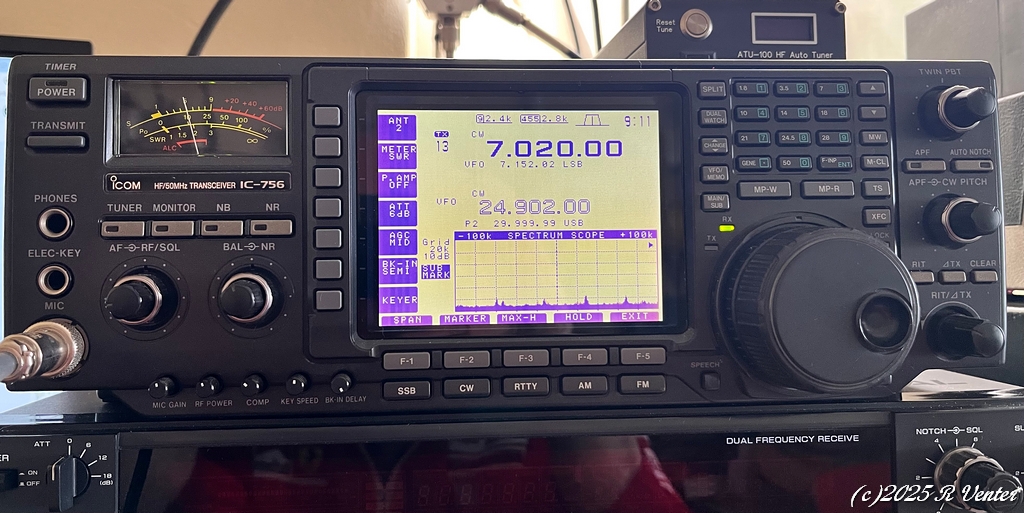
Icom
IC-756, ancient but still great.
Update
24/8/2025: I managed to work a few DX stations
yesterday on 15m so that is good news! Hopefully summer will bring some better
conditions.
Today, from 4pm till 7pm local, the SARL HF CW contest was
on the air. I was not really interested in competing, it is the usual SARL
contest with silly rules plus I know there are not many CW operators on the
air but I still decided to make a few contacts.
I ended up spending
about 45 minutes in the contest. I worked 12 local stations, 11 on 40m and 1
on 20m. Most of the stations I worked replied to my CQ call but I did work a
few who were calling. After that I did not hear any new stations so I QSY'ed
to 10m (Only small portions of 80m, 40m and 20m were allowed for the SARL
contest) so contacts on 10m could not count towards the contest.
I had
a great time on 10m! I managed to work quite a few stations many of them with
great signals. There was a YO contest going so lots of CW activity! I managed
to work everyone I heard even running 5W. I did hear a huge pile-up for T30TT
but I never heard the station, would have been a nice one to work!

Yaesu
FTdx-5000MP doing duty the last few days
Hopefully the bands will keep on improving, with
the SARL Field Day now less than 2 weeks away I am looking forward to camping
and working some DX.
Update
19/8/2025: Band conditions are still really bad,
for DX anyway, so it seems like most of my activity has been local recently. I
suppose that is the way it is but I am really hoping things will improve soon.
With my planned camping trip now less than 3 weeks away it would be terrible
if I end up only making local contacts!
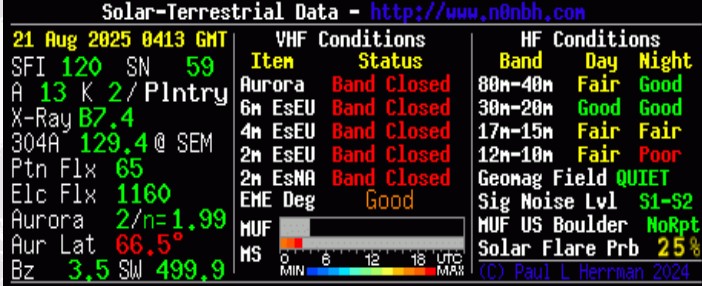
Not
exactly great DX conditions!
I have now received the 120V step-down transformer so this morning I could test the Kenwood TS-950SDX to it's full capabilities. It outputs 150W on all bands so that is great, I am still getting great audio reports as well. Managed to work some CW stations with it this morning as well, the keying is smooth and the CW filters work well. The receive audio is also fantastic, great news!
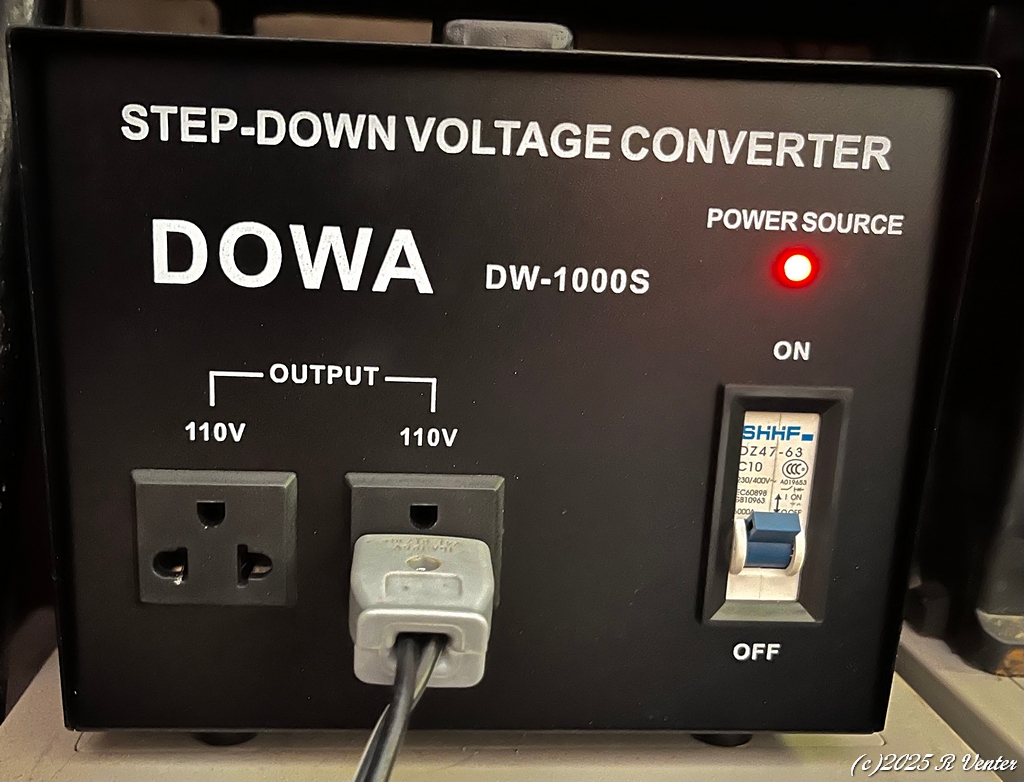
220V to 120V
transformer with more than the needed 700W capacity
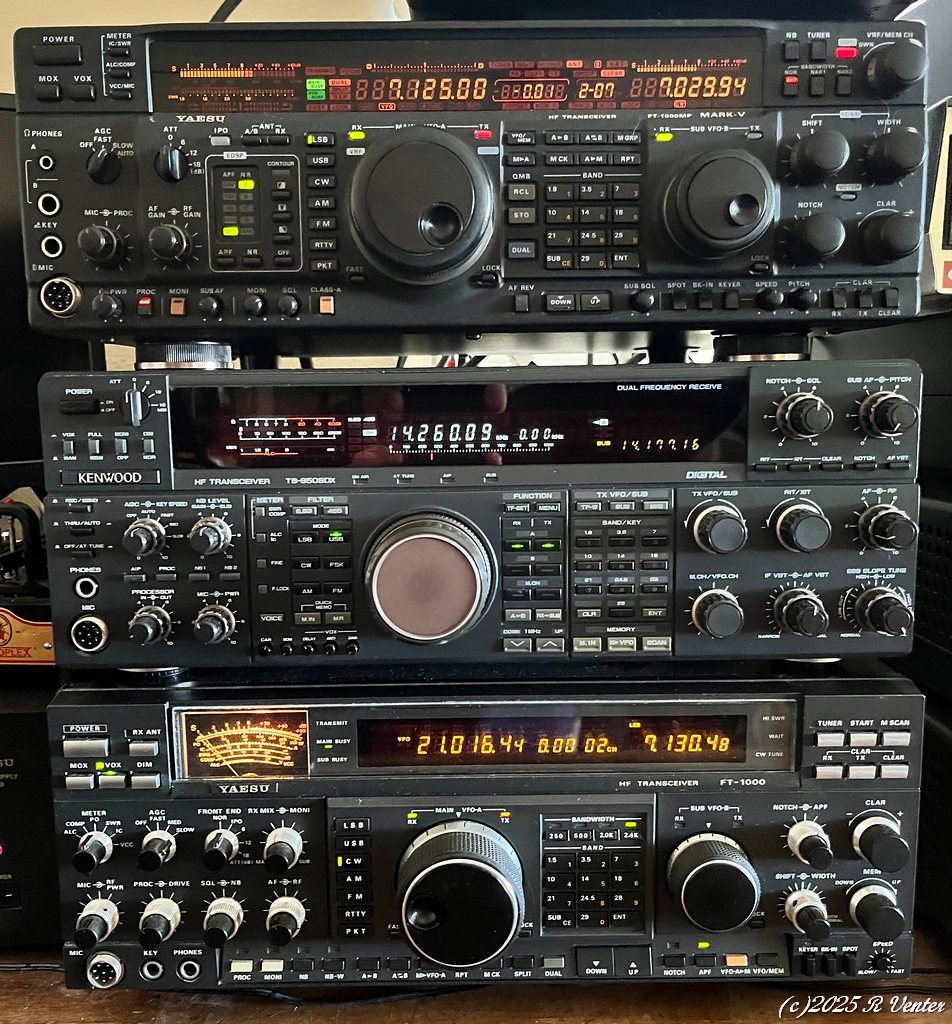
Yaesu FT-1000MP
mk5, Kenwood TS-950SDX and Yaesu FT-1000D, my station this morning
Update
18/8/2025: This morning I decided to do a bit of a
comparison between the Yaesu FT-1000D and the Kenwood TS-950SDX. These two
radios are from the same era, early to late 1990's. The FT-1000D is slightly
older, around 2 years but back then they competed for market share.
They both have pro's and con's. They are both fantastic radios. The receiver
on the TS-950SDX seems a bit quieter than the FT-1000D but it could be a
difference in sensitivity as well, I would need to check with a signal
generator. The filters seem better on the FT-1000D but it is close. The noise
reduction on the Kenwood works really well on pulse type noise but the noise
reduction on the Yaesu seems better for generic noise.
One point where
I believe the Yaesu has a clear advantage is with the dual receivers. On the
Yaesu you can use different modes between the main and sub RX, something that
is not possible on the Kenwood. The Yaesu also has 2 antenna connectors so you
can use a different antenna on the sub receiver, far better if the 2 receivers
are on different bands.
I think I will compile a more detailed
comparison between the 2 radios and post it as a separate article. For now I
can say I am enjoying using both of them!

The Kenwood
TS-950SDX above and the Yaesu FT-1000D below, both fantastic!
Update
17/8/2025: Today is my birthday, another year of
amateur radio behind me and hopefully one ahead as well! Band conditions are
still not great, I have only managed to make a few DX contacts the last week,
mostly on 40m early morning with a few on 15m in the afternoon. At least 40m
has been great the whole day locally allowing for some nice chats and catching
up with a few old friends.
This weekend it was the annual "Light houses
on the air" event. I believe there were 13 local lighthouses on the air, if
that is the correct amount I did manage to have QSOs with all of them, mostly
on 40m SSB but also a few on 40m CW. I did not hear any lighthouses on other
bands.
Yesterday I decided to test my portable/field station setup in
preparation for the SARL Field day in a few weeks time. I specifically wanted
to test how well a dipole would work, for local QSO's, on 40m compared to the
normal multi band EFHW I have been using recently. I cut and tuned a 40m
dipole and put it up on my 8m Comet mast. The EFHW was up slightly higher on
my 12m carbon mast. Due to the flexibility of the carbon mast I am no longer
using the top, thin, sections so it was up 9-10m.
Working station on
40m and switching between the antennas quickly convinced me that even though
the antennas performed similarly on strong signals the dipole had the edge on
weak signals. With this in mind, and taking into account how important local
QSO's will be on 40m with the current band conditions the decision was made to
use both antennas for the upcoming field day. I am planning on using the
dipole for 40m and the EFHW for the higher bands and DX if the bands should
open.
It is more work to put up 2 masts but since it is a 26 hour, over
night event I believe it is worthwhile.
I have manage to find a small
220V to 120V transformer, it was intended to work with a microscope but I
decided it is large enough to at least allow me to switch on the Kenwood
TS-950SDX. The good news is that the radio is working!
I did have to do
quite a bit of cleaning on the radio, the controls were really dirty! The
antenna tuner was also extremely noisy! I opened up the radio and cleaned plus
oiled the moving parts in the tuner. Now it is extremely quite and very fast
again.
The radio seems to be working well. I can only run 20-40W due to
the limitation of the small transformer but all seems well. The receiver is
really quiet. I have not really been able to check the sensitivity on the
higher bands, hopefully we will get some opening soon.
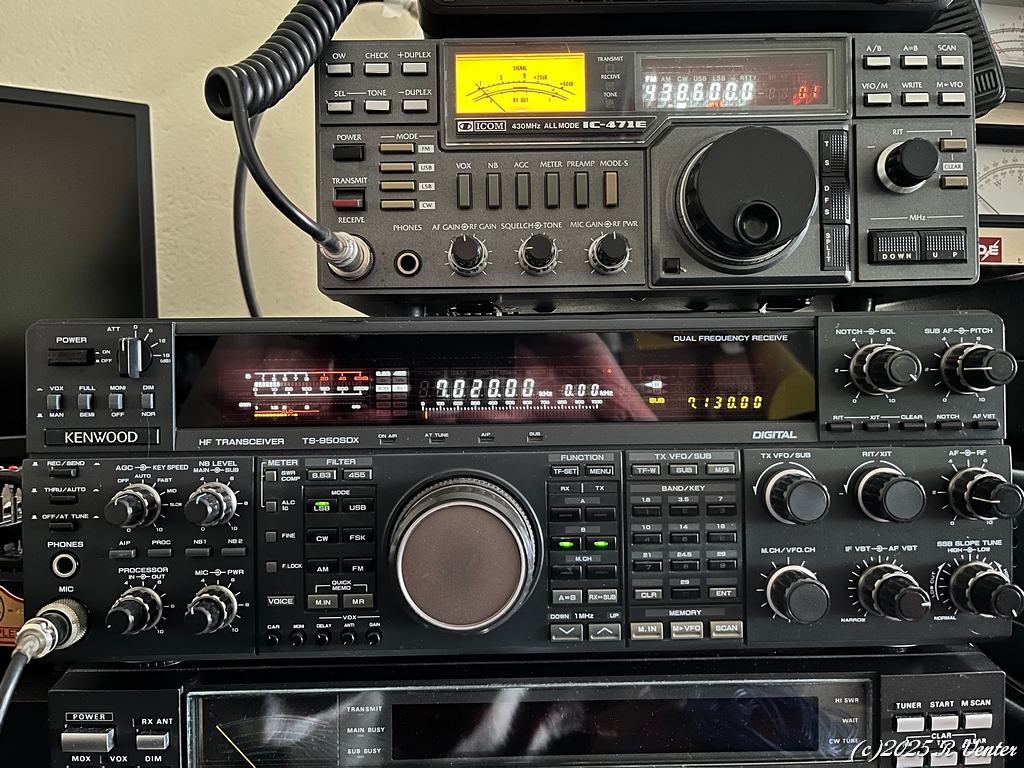
Kenwood
TS-950SDX on the air.
Update
14//8/2025: We
have our local, SARL field day on 6 to 7 September. As I have stated before I
am no longer actively competing in SARL contests but this could be fun! I have
been looking for an excuse to go and camp somewhere in the bush and setup a
field station. This could be the perfect excuse!
I think I should
combine it with a POTA activation, that would add an extra layer of activity
and fun!
Because it will be a field station (Single op, QRP) I can
actually drive to the location so no need to keep everything extra light for a
long hike. This will allow me to play with more than one antenna and maybe
test/compare a few radios. I am thinking of taking a 10-80m EFHW antenna, this
I can put up in the air using my 12m portable mast. I will also take my
smaller Comet 8M mast and maybe put up a 40m dipole aimed more at local NVIS
propagation.
I will also take my multi band 80-6m, vertical antenna.
This should be more suited for working some DX stations.
I still need
to decide where to go, there are a few local options, I will decide closer to
the time, the weather will also be a factor in the final decision.
Update 13/8/2025: The good news
is that the Kenwood TS-950SDX arrived today. The bad news is that sadly I have
not been able to test it because it is a 120V/60Hz version! A little fact that
the seller "forgot" to mention. Let's just say I am not impressed.
The
external key-pad, that is needed to access the SSB and CW memories was also
not included.
I am hoping the radio will be ok, sadly it was very
poorly packed, one layer of single cardboard and a few layers of light weight
bubble warp is NOT enough for a radio that weights 23KG! The box (it was a
modified box so not sturdy anyway), was in pieces by the time I got it. The
DSP cable connectors at the back of the radio were knocked out of the plugs.
So now I am waiting for the seller to see if he can find the key-pad
and the 240-120V transformer that was supposed to come with the radio. To be
quite honest I am not holding my breath, the transformer is not with him so
even if it is found it would take at least a week to get to me and from the
photo I have seen it looks like a home-brew unit and from the size it might
not even provide the 700W minimum specified by Kenwood.
So I have gone
ahead and ordered a nice 1KW unit from a local supplier, it will be here by 20
August. So it looks like I would have to wait till at least 20 August to see
if the radio works. I have not had many deals with fellow hams that left me
less than happy but this one did. Strangely the only other radio I ever bought
that had a problem that was not mentioned was a Kenwood TS-930.

New (to
me) Kenwood TS-950SDX
There is a bit of good news, I had a look at the installed filters and the radio does come with the optional 1.8kHz SSB and 500Hz CW filters installed. I would like to still add the optional 270Hz CW filter but I suppose I first need to check if everything is ok with the radio.
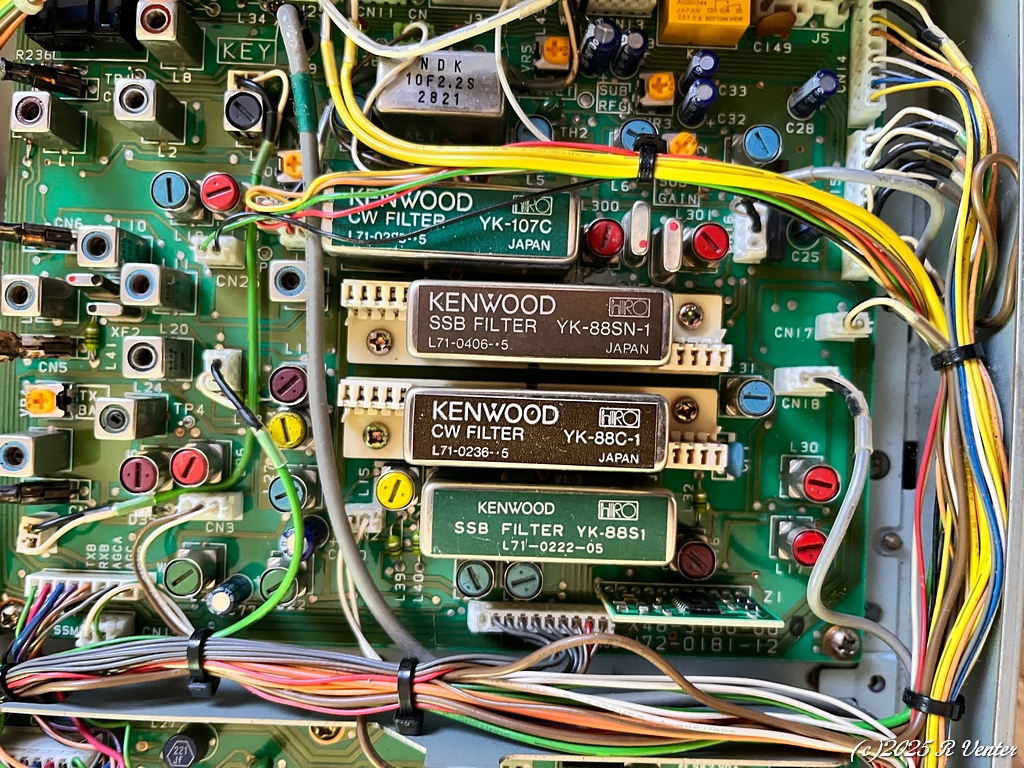
Optional YK-88SN-1 (1.8kHz SSB) and YK-88C-1 (500Hz CW) filters
I almost
bought a Kenwood TS-870S from the same source, glad I did not! The only reason
I did not buy it was that I remembered why I sold the TS-870S that I had
before. The way the filters work on the 870 is that you have 2 3kHz filters in
different IF stages. When you narrow down the filters they move in opposite
directions and the bit where they overlap gives you your pass band.
This is great in theory but in practice there is a problem. The AGC is also
derived from a IF stage BEFORE the filters. The result is that if there is a
signal inside the 3kHz pass band but outside the final filter pass band this
interfering signal will "pump" the AGC. The result is that you loose around
10dB of dynamic range.
This is the reason the TS-870S produced such a
bad score on the Sherwood dynamic range tests. In practice the result is that
especially on CW, where you can have many signals in a 3kHz pass band, the
radio really suffers. I disliked it so much the TS-870S is one of the few
radios I ever sold.
I almost forgot about this, glad I remembered in
time!
Update
11/8/2025: Since I moved to my current QTH, almost
6 years ago, I have had no VHF/UHF activity other than a few satellite
contacts. A while ago I discovered that there was one repeater, belonging to
the PEARS club in Port Elizabeth, that I could receive well and even trigger
with a handheld radio from home.
Sadly there seems to be little
activity on the repeated but the last few days I have been leaving a radio
switched on the repeater frequency of 438.600MHz. This has so far resulted
in 3 QSO's, I must admit that even though I have never been a repeater fan it
is great to chat to some like minded people again!
I am even
considering acquiring a VHF/UHF radio again for mobile use, it would also be
useful as I am considering getting involved with motor rally communication
again, we had great fun with it in the past. Time will tell if I get involved
again.
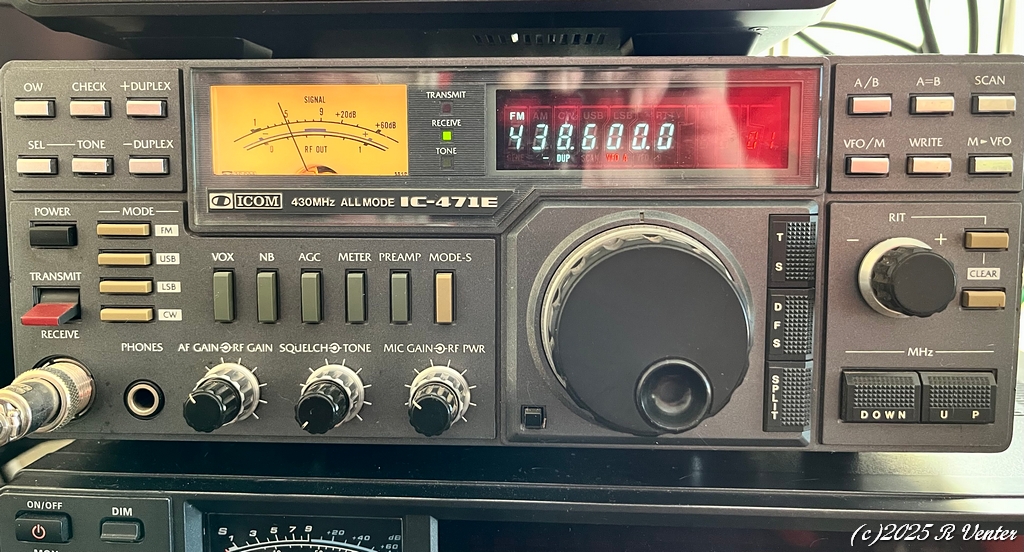
My now
ancient Icom IC-471E being used again, it has been at least 28 years since it
was last switched on!
Update
9/8/2025: Things have been really quiet on the
radio front, band conditions have been the worst I have seen during the last 5
cycles for this part of the cycle. Seems like we get regular SME's with the K
index high most of the time. There has been some good periods but on average
it has been rather bad.
My Raspberry Pi based Hermes project is now
complete and working well. It is a fun system to use and it is really
performing well. I find it amazing how little CPU/Memory resources the system
is using on the Pi, it is running far better and smoother than with the same
software on a top-end windows based laptop. Seems like Linux is just so
efficient and light on resources compared to windows!
Other than a few
local rag-chew QSO's on CW and SSB I have managed to work some CW DX but sadly
nothing new. Hopefully the coming summer will produce better conditions as it
usually does.
On the equipment front not much is new, I have been
rotating radios in the operating position again. At the moment I am running
the Yaesu FT-2000D, what a great radio! I love the full dual receive, the way
Yaesu has implemented this, with 2 separate VFO knobs is so much better than
the Icom way.
I have just added one radio to my collection, it is not
here yet, should be here in 4 days. It is a pristine Kenwood TS-950SDX, a
radio that is described by many as the best radio ever produced by Kenwood. It
comes from the era (mid 1990's to early 2000's) that fits in well with the
rest of my collection of "best and last of breed flagship" radios, before the
SDR/digital age, by the 3 big brands. I have been looking for one in a good
condition for years! At 23kg it is in the same size and weight class as the
iconic Yaesu FT-1000D, another radio I love.
The TS-950SDX and the
TL-922 amplifier was the combination sold by Kenwood as the "ultimate" station
so I will pair one of my 2 TL-922's with the TS-950SDX for some nostalgic
times.
I am really looking
forward to trying it on the air! I will post some photos as soon as it is
here.
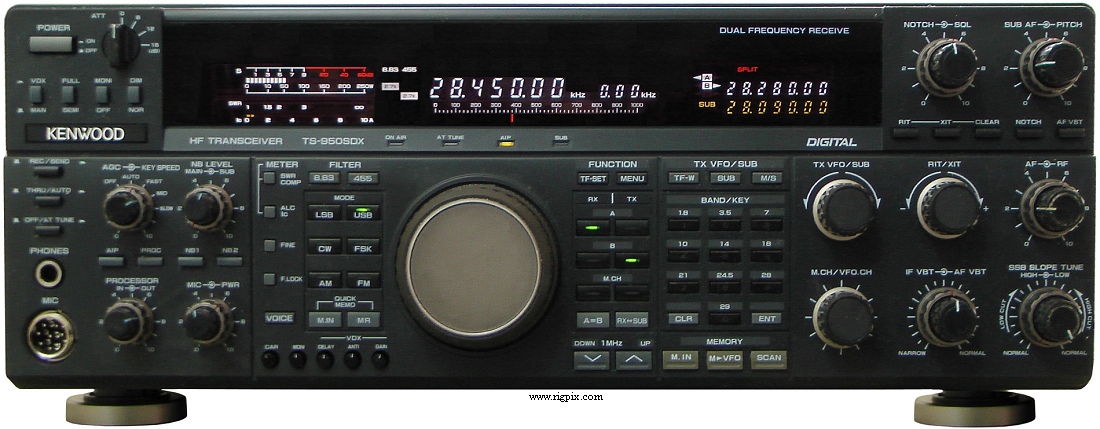
Not my
photo, (c)Rigpix, but this is what the Kenwood TS-950SDX looks like.
Update
19/7/2025: It is the winter leg of the SARL QRP
contest today. I have not really competed in any SARL contest the last few
years so I decided it was time to join in the QRP fun again!
I decided
to combine it with a POTA activation. Since I did not have time for a lot of
traveling I decided to activate my local POTA site, Suikerkop Hiking trail
(ZA-0078) again.
After I planned everything I decided to just read the
SARL rules for the QRP contest to make sure I do not make a fool of myself.
Sadly I discovered that the rules specifically forbid combining the contest
with any POTA/SOTA activity! Sorry, but I think that is just plain stupid! Now
I remember why I do no compete in SARL contests, so many silly illogical and
annoying rules....
Anyway, I decided to still go and have fun in the
contest, I decided I would simply not send in the log to the SARL (as a silent
protest!) and just make it a POTA activation.
I ended up having fun.
Sadly no DX contacts, it was too early in the day (7:00 to 9:00 UTC) but I did
manage to make quite a few local contacts on SSB and CW. Some of the contacts
were made running only 1W!
Equipment consisted of my well loved Xiegu
X6100 and an EFHW antenna held up with a 12m telescopic mast. Since there are
no trees taller than 2m on the hiking trail I had to use a mast!
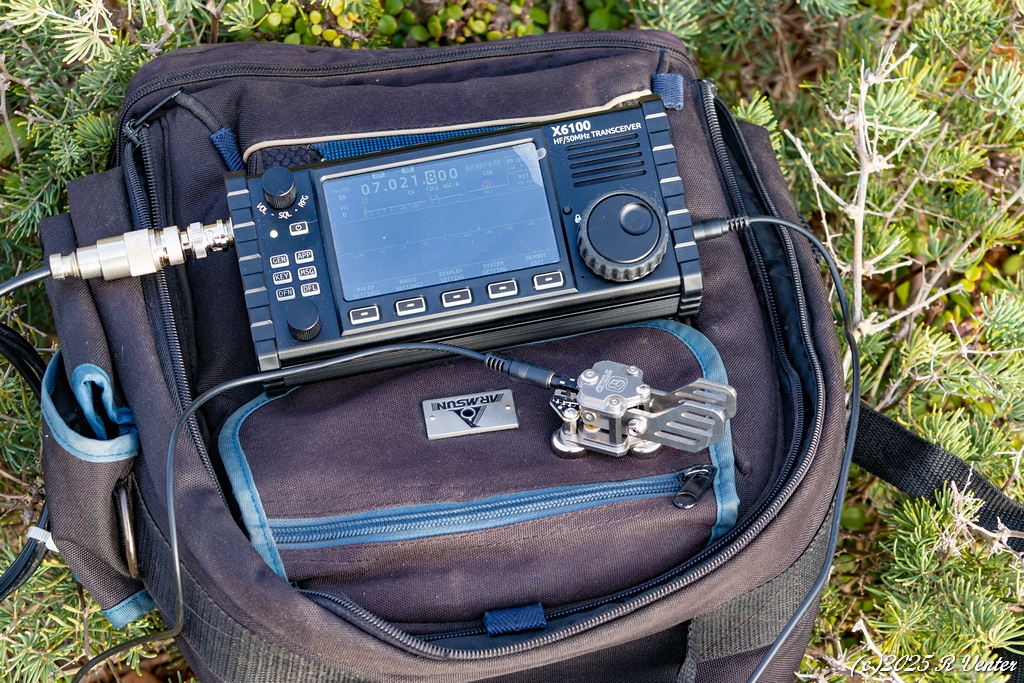
Minimalistic
station.
Station and antenna, yes, that pole is VERY flexible!
I ended up running the
whole 2 hours plus on the internal battery of the X6100, low power does have
it's advantages. I am looking forward to spring and some warmer weather for
more activations! It was only 2.5C when I started!
Update 14/7/2025: Band conditions have not been
great! Because of that I have not spent much time on the air recently. I did
spend quite a bit of time building my "PiHermes" SDR radio.
The radio
consists of a Hermes Lite 2 SDR transceiver, a 100W linear amplifier and an
automatic tuner all in a 3D printed box. Also in the box is a Raspberry Pi 5
(8GB) running PiHPSDR software. The radio has a 10.1" touch screen as well as
Bluetooth connected mouse and keyboard.
The result is a fully
stand-alone SDR radio that does not need an external computer, just power
(12V) and an antenna! I will be doing a write-up on this soon and I might also
publish the 3D STL files for the box.
The radio is really performing
well, the Pi 5 has no problem handling the workload with no latency issues and
has plenty CPU and memory resources spare to also run web browsers, WSJT,
Winlink or any other software you might desire.
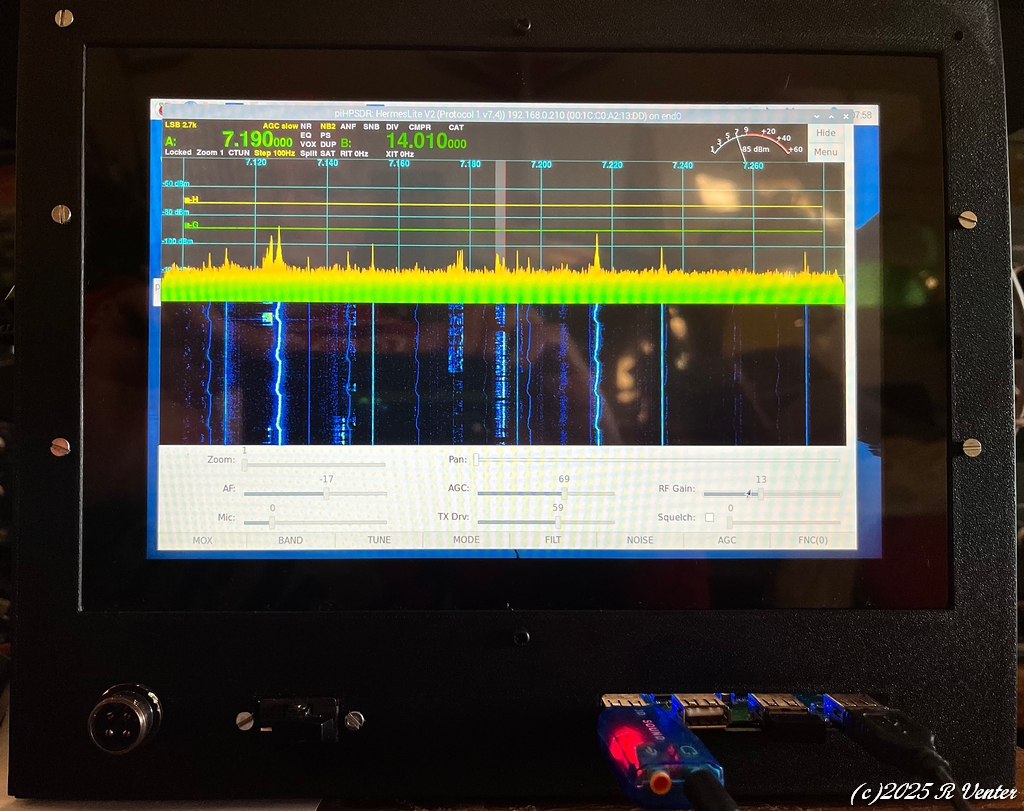
PiHermes on the
air for the first time!

Running 2
receivers at the same time.
Update
29/6/2025: ARRL field day 2025! I normally do not
specifically go and try to work US stations during the ARRL field day but this
morning I felt like spending some time in nature. Since I have not setup a
field station in a very long time I decided to change from my usual
minimalistic portable setup and take a chair, table and a "full-size" radio
for a change.
My setup consisted of my trusty Icom IC-7300, not the
ideal radio if you have more than one radio running at the same time but since
this was a single-operator single-radio setup it was fine. My antenna
consisted of the EFHW and a 12m telescopic pole.
I only worked a few US
stations but it was fun! I also worked some local stations and the 2.5 hour
session turned out to be real fun with quite a bit of rag-chewing, both on SSB
and CW.
I should do this more often!

Relaxed SSB/CW
early morning session!
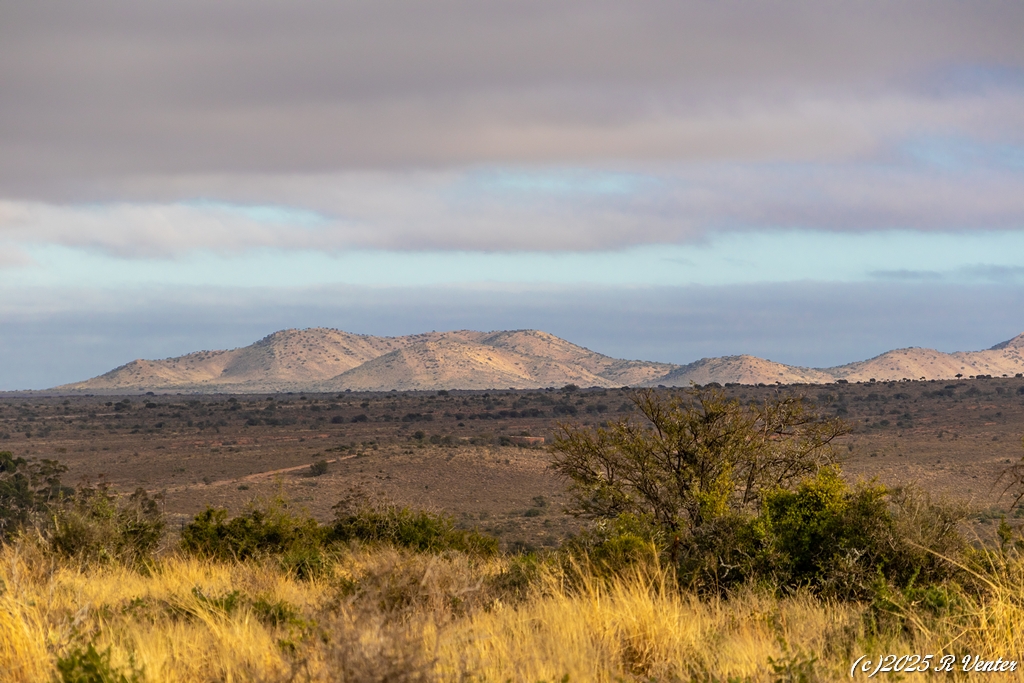
The view
Update
24/5/2025: Band
conditions have been particularly bad recently, DX band conditions anyway.
Locally the 40m band has been great, even during the middle of the day. At
night 80 has also been fine for local contacts.
There was huge
excitement in the DX community when Marion Island was activated as ZS8W. As
expected the pileups were huge. Sadly the operator concentrated on FT8. He did
work short periods of CW and apparently he also made a few SSB contacts but
only to friends. His QSO rates on CW were quite low, sometimes less than one
QSO per minute. I am not sure if the pileups were too large or if he had bad
QRM/QRN but the result was that it was not easy to work him on CW and that
lead to huge frustration on the bands. As per usual that also brought out the
worst in some operators with lots of deliberate QRM and bad messages on the DX
clusters. I managed to work him on 9 band-slots but only 2 of those were CW. I
heard him very strong on 10m as well but only for a few minutes every time
before he went QRT.
I am happy that I did manage to work him for a new
entity on QRP but it could have been better.
Our local AWA (Antique
Wireless Association) now runs an early Saturday morning net specifically for
older radios, great fun! So far I have only used my Yaesu FT-901DM and the
Icom IC-701 on the net but I am hoping to get my Kenwood TS-520S and TS-930
going again as well. I would also like to get at least one of my two Yaesu
FT-200's going again as well. Something interesting to do!
The old (47
years!) FT-901DM is still perfect. Great receiver and the output is still more
than 100W with the original 6146B valves in the final.
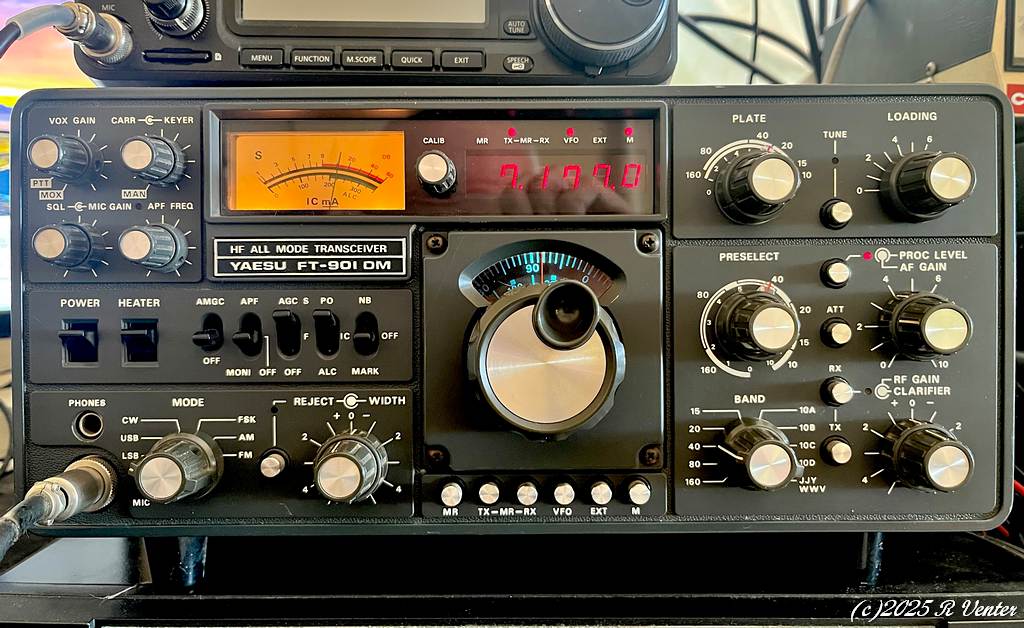
Yaesu FT-901DM on the
air, 1978 vintage.
Update
3/4/2025: Sadly I have not been
active so far this year. I often listen to a few stations in the morning on
40m but I only have 2 QSO's in the log so far in 2025! Both were CW DX
contacts just for fun.
With winter around the corner I hope to do a few
POTA activations soon, it has simply been too hot during the summer to go
hiking. I had fun last year with POTA so hoping to have some more fun soon.
The results were released for the 2024 CQ WW DX CW contest. I managed to
reasonably well but, as expected, it would need a serious effort to compete
with stations in Europe and North America as they are simply so much closer to
lots of DXCC entities. Running QRP makes it really difficult to be heard in
Europe and North America when the bands are so crowded. But it was still fun,
maybe I will do it again in 2025.
Here is my certificate.
At least I managed #1 in Africa and South Africa as well as setting new
country and zone records.
Hope to be posting more regularly in the near
future!
Home
(c)R Venter 2025